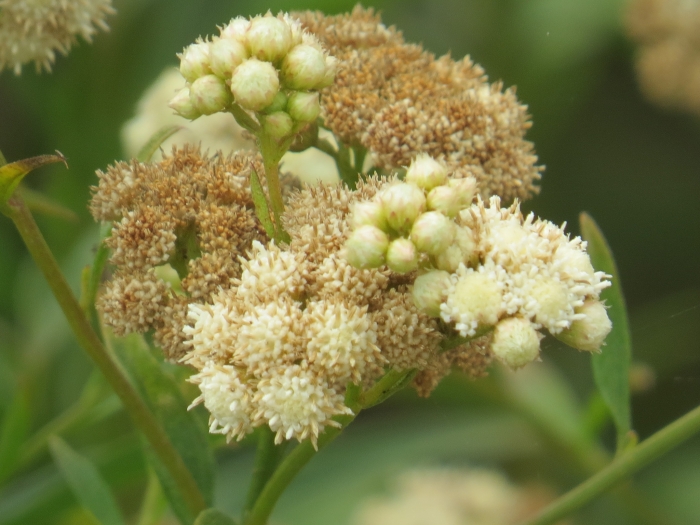Saltmarsh Baccharis
(Baccharis glutinosa)
Saltmarsh Baccharis (Baccharis glutinosa)
/
/

© Garth Harwood
CC BY 4.0
Image By:
© Garth Harwood
Recorded By:
Copyright:
CC BY 4.0
Copyright Notice:
Photo by: © Garth Harwood | License Type: CC BY 4.0 | License URL: http://creativecommons.org/licenses/by/4.0/ | Uploader: garth_harwood | Publisher: iNaturalist |


















Estimated Native Range
Summary
Baccharis glutinosa, commonly known as saltmarsh baccharis or Douglas’ falsewillow, is a rhizomatous perennial herb native to wetland areas, including salt marshes, freshwater marshes, and riparian zones in western South America. It is also found in wetland regions of South America, such as Brazil and Bolivia. This species typically grows 3-7 feet tall and has lance-shaped leaves that can reach up to 5 inches long. The foliage and inflorescences are notably resinous and sticky to the touch. Baccharis glutinosa is dioecious, meaning individual plants are either male or female. Male plants produce whitish staminate flowers, while female plants bear fluffy whitish pistillate flowers that are wind-pollinated.
Saltmarsh baccharis is valued for its adaptability to wet conditions and is often used for erosion control and habitat restoration in its native range. It thrives in full sun to part shade and prefers moist to wet soils with good drainage. While not commonly used in ornamental horticulture, it can be an interesting addition to water gardens or naturalized areas. Gardeners should note that due to its rhizomatous nature, it can spread and may require management to prevent unwanted colonization. Additionally, it is important to plant male and female specimens if seed production is desired.CC BY-SA 4.0
Saltmarsh baccharis is valued for its adaptability to wet conditions and is often used for erosion control and habitat restoration in its native range. It thrives in full sun to part shade and prefers moist to wet soils with good drainage. While not commonly used in ornamental horticulture, it can be an interesting addition to water gardens or naturalized areas. Gardeners should note that due to its rhizomatous nature, it can spread and may require management to prevent unwanted colonization. Additionally, it is important to plant male and female specimens if seed production is desired.CC BY-SA 4.0
Plant Description
- Plant Type: Herb, Shrub
- Height: 5-10 feet
- Width: 5-10 feet
- Growth Rate: Rapid
- Flower Color: White
- Flowering Season: Fall
- Leaf Retention: Deciduous
Growth Requirements
- Sun: Full Sun, Part Shade
- Water: Medium, High
- Drainage: Fast, Medium, Slow
Common Uses
Bank Stabilization, Bird Garden, Butterfly Garden, Deer Resistant, Drought Tolerant, Erosion Control, Low Maintenance, Water Garden
Natural Habitat
native to wetland areas, including salt marshes, freshwater marshes, and riparian zones in western South America
Other Names
Common Names: Seepwillow, False Willow, Douglas’s False Willow, Chilquilla, Saltmarsh Baccharis, Mule Fat
Scientific Names: , Baccharis glutinosa, Baccharis angustifolia, Baccharis angustifolia, Baccharis farinosa, Baccharis glutinosa var. angustissima, Baccharis glutinosa var. foliosa, Baccharis huydobriana, Baccharis litoralis, Baccharis medullosa
GBIF Accepted Name: